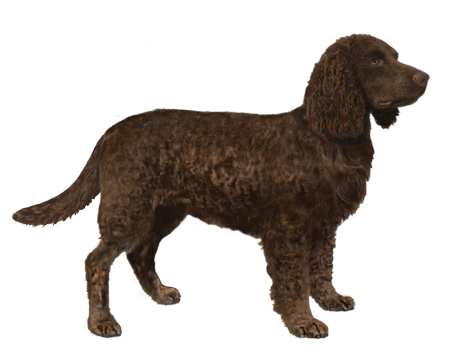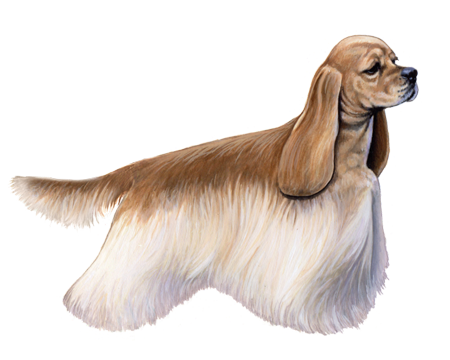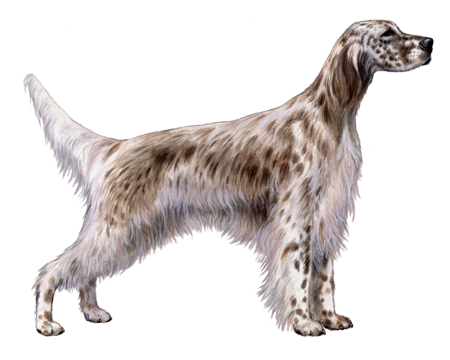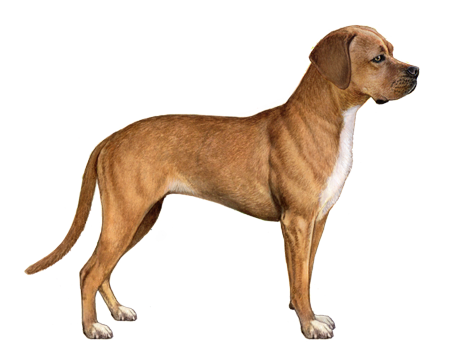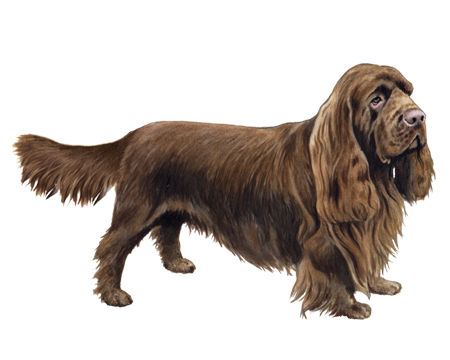
Flat-Coated Retriever
The Flat-Coated Retriever is a very intelligent breed. Good-natured, energetic, active, and eager to please, these retrievers make versatile working dogs and loving family members. Flat-Coats display their cheerful, outgoing attitude through their happily wagging tails.
Interested in discovering if your dog is a Flat-Coated Retriever?
Check out Wisdom Panel's DNA tests.

Flat-Coated Retriever Traits
General Appearance
The Flat-Coated Retriever has a happy, active demeanor, intelligent expression, and clean lines. In silhouette, the Flat-Coat has a long, strong, clean, "one-piece" head—the breed's most distinctive feature.
Coat and Colouring
The Flat-Coated Retriever's straight, flat-lying coat may be slightly wavy. Moderately dense, it protects from water, weather, and ground cover when the dog is working.
Flat-Coats have thick feathering on their ears, fronts, chests, backs of forelegs, thighs, and undersides of their tails. Often they also have a mane of longer, heavier hair on their necks. The breed's coat comes in solid black or solid liver. A yellow coat is possible but falls outside the breed standard.
Distinctive Physical Traits
The Flat-Coat's trademark "one-piece" head features a fairly flat skull, clean cheeks, and long, strong, deep muzzle. This breed's relatively small ears are covered in thick feathering and lie close to the head. Flat-Coats have an alert, intelligent, and kind expression. Their almond-shaped eyes are set widely apart and are dark brown or hazel.
Flat-Coated Retriever Temperament
Flat-Coated Retrievers love their families and enjoy spending time with their favorite humans. They need to receive a lot of attention to be happy. Including them in your outdoor adventures and making them a part of everyday family life are the best ways to help these energetic dogs thrive.
This breed is slow to mature. So, rambunctious, puppy-like behavior continues well into adult years. In fact, some owners say Flat-Coats never lose their light-hearted, youthful ways.
Flat-Coated Retrievers are friendly with other dogs and pets but may seem reserved around people they don't know.


Flat-Coated Retriever History
The Flat-Coated Retriever, bred in 19th-century England, is one of the oldest retriever breeds. Their origins likely come from Newfoundland Wavy-Coated Retrievers that were imported and then crossed with Setters.
A breeder named J. Hull established the first Flat-Coated Retriever breeding program in 1864. At that time, shooting birds in flight—rather than on the ground or a perch—was growing more popular. And hunters needed a dog that could retrieve dead and wounded birds from the water.
Flat-Coats turned out to be a natural gundog both in and out of the water. In fact, from roughly 1890 until the first World War, they had such an excellent reputation that they were the most popular retriever in Britain. However, due in part to the rising popularity of Labradors and Golden Retrievers, the breed's popularity fell dramatically by the end of World War II.
The Flat-Coated Retriever gained AKC recognition in 1915.
Flat-Coated Retriever Care
Nutrition
Flat-Coated Retrievers need high-quality food that's appropriate for their life stage (e.g., puppy, adult, senior) and activity level. To prevent them from becoming overweight or obese, keep an eye on their food intake. And don't forget to account for treats in their overall calorie intake. As a guideline, treats should make up no more than 10% of their daily calories.
Grooming
Flat-Coated Retrievers are above average-shedders. Weekly brushing with a metal dog comb will help remove loose hair and keep their coats clean.
Though nails will wear down during regular activity, they'll likely need routine trimming to keep them at an ideal length. Overgrown nails can cause pain and may eventually lead to problems walking.
Maintaining good dental hygiene is essential for any dog's long-term health. In addition to professional dental cleanings, establish an at-home care routine that includes regular teeth brushing.
Exercise
Like most breeds in the sporting group, Flat-Coated Retrievers need a lot of daily exercise. Luckily, they are up for just about any activity, including long hikes, running, or backyard games of fetch.
They also enjoy dog sports such as flyball, frisbee, hunt and field trials, agility, tracking, and both rally and competitive obedience. These activities both give your Flat-Coat a needed outlet for their physical energy and provide mental stimulation.
Training
Flat-Coated Retrievers are responsive and eager to please, so they are generally easy to train. Due to their sensitive nature, they respond best to gentle techniques and positive reinforcement.
True to their heritage, Flat-Coats are known to retrieve items from around the house or yard. It's not uncommon for them to bring back shoes, a child's stuffed animal, or other household items. Fortunately, they are also very food-motivated, which can be helpful when training them to release items that they've retrieved. Simply offer a favorite treat in exchange for whatever it is that they have in their possession.
Finally, early socialization will help Flat-Coated Retrievers develop into well-mannered adult dogs.
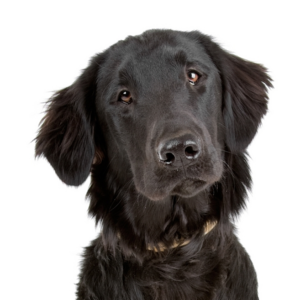
Flat-Coated Retriever Genetic Health Conditions
-
Obesity risk (POMC)
A number of factors can affect appetite and risk of obesity. This particular test detects a mutation in the POMC gene, known to regulate appetite, that has been associated with increased appetite and obesity in dogs. The associated genetic variant has been identified in the Labrador Retriever and Flat-Coated Retriever. The clinical significance of this variant in dogs of other ancestry is not yet clear.
Knowing if your Flat-Coated Retriever is a carrier or at-risk for these conditions can help you and your veterinarian plan for your pup's lifelong care. With Wisdom Panel™ Premium, you can get results for over 200 genetic health tests.
Breed Group
Sporting
The sporting group breeds are incredibly diverse in personality and appearance, but can be characterized as very sturdy. They were developed to work closely with people and in general have a very responsive nature and high intelligence.




